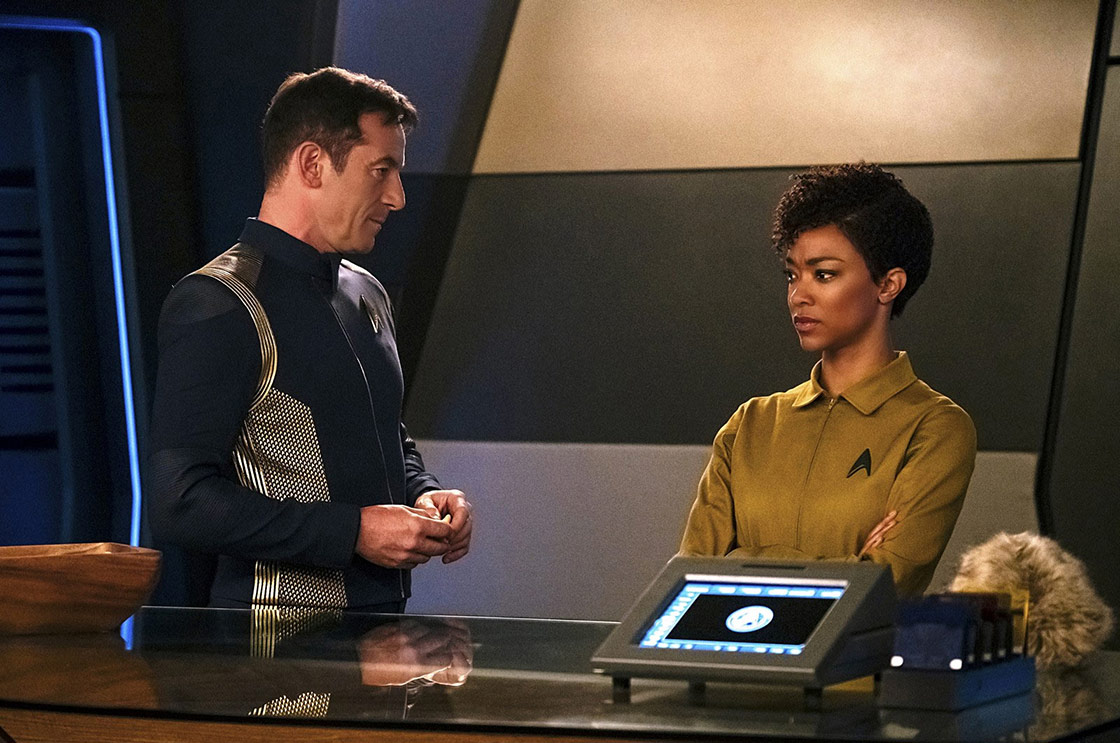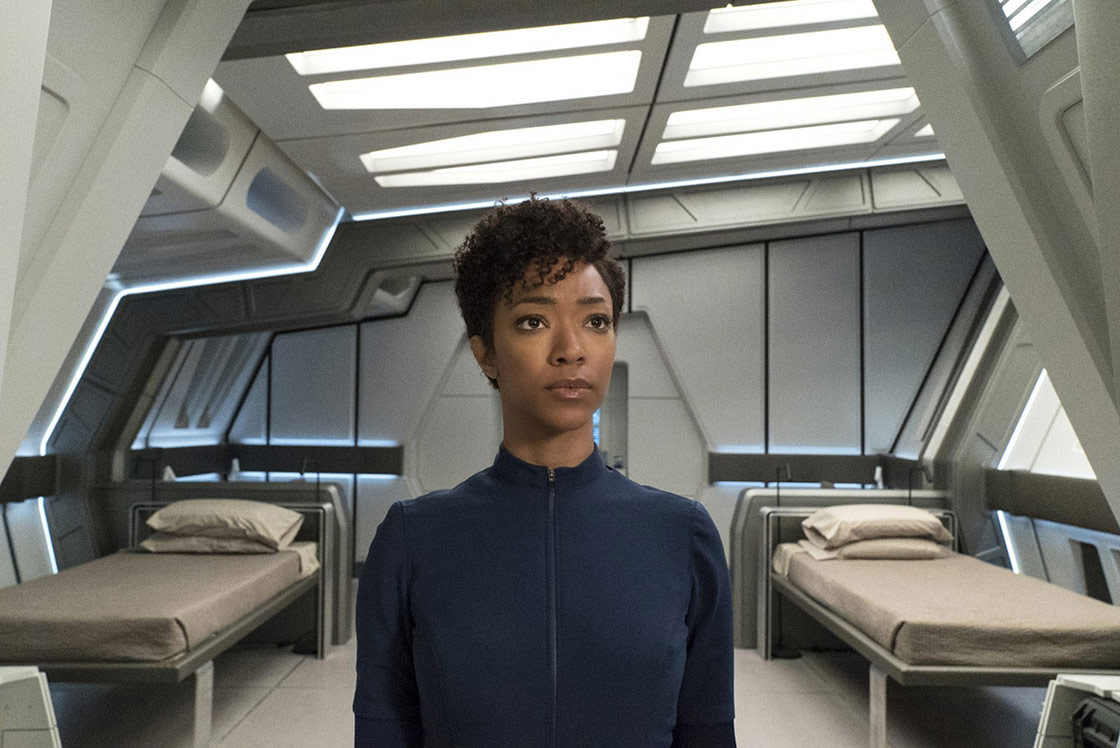After an uneven but nonetheless engaging two-episode opener, Star Trek: Discovery kicks its story into full gear with its third episode and unofficial ‘second pilot,’ “Context is for Kings,” which finds the disgraced Michael Burnham (Sonequa Martin-Green) recruited to serve aboard the USS Discovery after being rescued from a doomed prison transport shuttle en route to Tellun.
Six months have passed since Burnham committed mutiny and essentially triggered the Federation-Klingon war. On Discovery, Burnham learns Captain Gabriel Lorca (Jason Isaacs) and scientist Lt. Paul Stamets (Anthony Rapp) is experimenting with a form of spores as a way to advance transport capabilities in space and potentially defeat the Klingons.
Burnham is given a chance to redeem herself (or at the very least, make herself more useful) as part of Lorca’s covert scientific mission.

By episode three, it’s pretty clear that Star Trek: Discovery isn’t your father’s Star Trek. The show is slicker, darker, and brimming with more character conflict than anything the series could muster during its Rick Berman years — its closest comparison in the franchise would perhaps be Star Trek: Deep Space Nine.
It’s also enveloped in an ever-present haze of mystery, a trait that is only amplified by telling the episode almost exclusively from the point of view of Burnham, who tries to unravel the machinations of Discovery’s mission.
As new as Discovery feels, there’s something also refreshingly familiar about it as well. Bringing a character with a checkered or damaged past aboard a series starship as a way to redeem themselves or find renewed purpose is certain nothing new to Star Trek. Think back to The Next Generation and Voyager with characters like Tom Paris, Ensign Ro, and Tam Elbrun, the troubled Betazoid from the terrific TNG episode “Tin Man.”

There are certainly other character examples out there. Star Trek always seemed willing to give bad people a second chance — particularly if their skills were appropriate to a important mission. Discovery is the first to switch the point-of-view to one of these damaged, non-command-level characters and craft a series that follows their journey to some kind of redemption.
Or is it? Instead, does Discovery have a less-obvious and darker purpose for Burnham?
It’s still way too early to tell where Burnham’s character will end up. How far does the rabbit hole go down for her? As she points out in the episode’s closing moments, sometimes up can be down. Burnham’s path ahead could lead anywhere.
After a rather shaky introduction in “The Vulcan Hello” — marked by a clumsy, talky, and awkwardly-directed exchange with Captain Georgiou on its desert planet opening — Burnham has emerged as a truly fascinating and layered character. Sonequa Martin-Green deserves an enormous amount of credit for the heft she brings to the role.

It’s easy to dismiss Cadet Tilly (Mary Wiseman) as Discovery’s first irritating character; I kept getting flashbacks to Ensign Sonya Gomez, another nervous and eager-to-please-to-the-point-of-nausea character for TNG’s second season. It’s going to be interesting to watch her relationship with Burnham evolve.
It seems obvious that Burnham is being set up as a potential mentor to help tame her nervous tendencies and grow into a leader and future captain that she wants to be. As long as Discovery keeps its eye on the ball and not get too mired in its war story at the expense of its characters’ personal journeys, we will have a truly winning series that offers something new while staying true to the humanistic spirit of Star Trek.
Kudos needs to be given to director Akiva Goldsman, who improves upon the jarring and inconsistent pairing of David Semel and Adam Kane, who helmed the first two episodes. To give Discovery a pass, it’s not uncommon for a new Star Trek series to start out not exactly knowing how it should look, or even sound — a problem The Next Generation wrestled with for its first few years.

Goldsman gets pretty close, finding a look that at least services “Context” adequately. Composer Jeff Russo also keeps the music appropriately mysterious and spooky.
As a story that’s essentially a single link in a much larger chain, “Context” is difficult to review on the merit of its singular plot. Beyond Burnham’s decision to stay aboard Discovery, there’s no real resolution offered. Of course, that’s the intent.
It will be interesting to see where things progress. On the whole, “Context is for Kings” offers an engaging setup for the much larger story to follow, with compelling character introductions and dense moral and ethical implications that promise a none-too-easy period of adjustment for Burnham as the USS Discovery’s newest crew member.
![]()
Star Trek: Discovery returns this Sunday with episode four: “The Butcher’s Knife Cares Not for the Lamb’s Cry.” Watch for our ongoing Canon Connections series to continue later this week as we look for the ties to Trek‘s past in this most recent episode!
Rob Heyman is a freelance journalist and entertainment critic. He is a regular contributor to both TrekCore and The Logbook, where he has written episode reviews of Star Trek: The Next Generation, Voyager, and the Star Trek movies.
